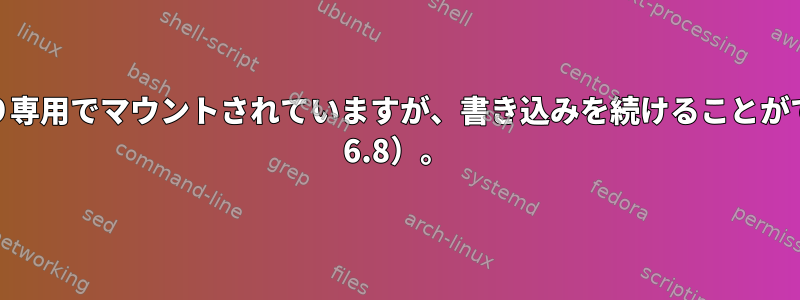
フラッシュドライブにCentOS 6.8がインストールされており、寿命が制限されている(書き込み100,000回(各セクタが失敗するまでの平均時間))、読み取り専用でマウントしたいと思います。
カーネルはroで起動すると言われています。少なくとも結果はcat /proc/cmdline「ro...」で始まります。
/etc/fstabマウントを読み取り専用に設定しました。
UUID=4addd4a7-97f6-4399-89e4-6d3728bd2979 / ext4 defaults,noatime,ro 1 1
UUID=21a81149-6534-4313-8696-e203896d5881 /boot ext4 defaults,noatime,ro 1 2
UUID=D64B-DD9C /boot/efi vfat noatime,ro,umask=0077,shortname=winnt 0 0
tmpfs /dev/shm tmpfs defaults 0 0
devpts /dev/pts devpts gid=5,mode=620 0 0
sysfs /sys sysfs defaults 0 0
proc /proc proc defaults 0 0
tmpfs /var/log tmpfs defaults 0 0
実行してみると、mountの仕様に従うことがわかります。/etc/fstabそれでもファイルを変更し、新しいファイルを書き込むことができます。実行中のマウントが書き込み可能であるという追加の証拠lsof(以下に従う)この投稿)。結果によれば、ほとんど/homeに書き込むために開いているファイルがいくつかあります。 (これを/var/log達成するにはtmpfs。
CentOS 6.8のバグですか?解決策はありますか?
答え1
おそらく、マニュアルページでデバイスを読み取り専用にするには、デバイスを再マウントする必要があるというバグがあることを読んだ覚えがあります。
mount -o remount,ro ...
fstabの他の項目の後ろにマウントを追加してみてください。 fstabでは、psマウントにファイルシステムを「none」として指定できます。
修正する:
関連 man エントリが見つかりました。
mount(8) since v2.27 allows to change the mount options by passing the relevant options along with --bind. For example:
mount --bind,ro foo foo
This feature is not supported by the Linux kernel; it is implemented in userspace by an additional mount(2) remounting syscall. This solution is not atomic.
The alternative (classic) way to create a read-only bind mount is to use the remount operation, for example:
mount --bind olddir newdir
mount -o remount,ro,bind olddir newdir
Note that a read-only bind will create a read-only mountpoint (VFS entry), but the original filesystem superblock will still be writable, meaning that the olddir will be
writable, but the newdir will be read-only.
It's impossible to change mount options recursively (for example with -o rbind,ro).
これに基づいて、fstabオプションを試すことができます。
default,rbind,ro
失敗した場合は、エントリを追加して再インストールしてください。
アップデート2(man 8マウント/ man 8マウントblockdev);
-r, --read-only
Mount the filesystem read-only. A synonym is -o ro.
Note that, depending on the filesystem type, state and kernel behavior, the system may still write to the device. For example, ext3 and ext4 will replay the journal if
the filesystem is dirty. To prevent this kind of write access, you may want to mount an ext3 or ext4 filesystem with the ro,noload mount options or set the block device
itself to read-only mode, see the blockdev(8) command.
つまり、以下を選択できます。
ro,noload
または使用
blockdev --setro /dev/...


